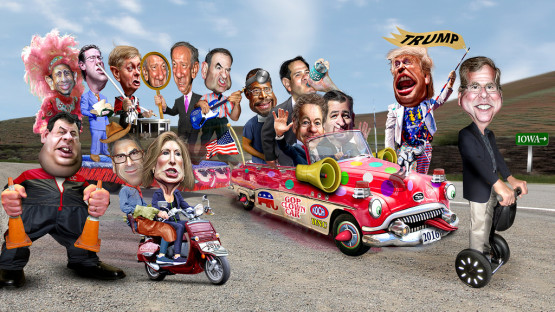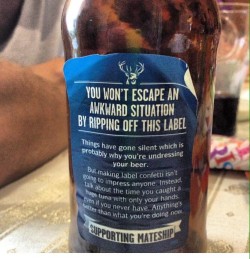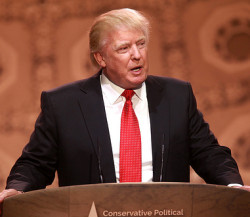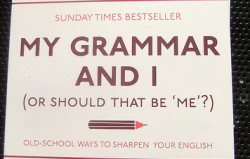Blog Archives

Photo by DonkeyHotey 
“What I’m thinking is this. When I’m president, we’re not just going to build a wall, but also a moat. Imagine Border Patrol sitting atop the wall, looking over the moat, armed with POISON DART GUNS! They won’t even have to use them because none of the Mexicans would dare approach the wall, because the moat will have alligators and the Border Patrol officers will be wearing PIRATE HATS! The pirate hats will have the scary skull and crossbones and the crocodiles will be HUNGRY! No one would dare go up to my moat. It’ll be great. The greatest moat setup the world has ever seen!” -Donald Trump
“Donald Trump announced today bold new plan today to build a moat staffed with alligators, and to staff his border wall with border patrol officers wearing pirate hats and armed with blow darts. We will discuss the merits of his bold new proposal today…” -some Fox News show
“Anyone who looks at my record will see that I have always supported a moat with alligators, or ‘gators’ as we like to call them in Texas. And there is really nothing on his agenda that I can say that I oppose from the moat to the blow darts. It’s a terrific idea from start to finish.” -Ted Cruz
“Rafael Cruz says he’s in favor of ‘cocodrilos’ along the border wall, but betrays us on the pirate hats. Just another RINO, or as they would say in Rafael’s native language ‘rinoceronte.’ I don’t speak Spanish, though, because I am an American, but Rafael Cruz probably does because he isn’t. Remember.” -Ann Coulter
“Are we really going to do this pirate thing? Okay, then, while I understand some of the apprehension surrounding immigration, we need to approach this serio… I’m sorry. Really? We’re really going to talk about pirates?” -Carly Fiorina (more…)
 Malcolm Harris writes of the dark history of liberal reform.
Malcolm Harris writes of the dark history of liberal reform.
Meet Freddie, the cow that escaped the slaughterhouse and found a home.
Warm winter weather is bad for squirrel waistlines.
I wish this piece on the awesomeness of consumer choice had chosen something other than blue nail polish as an example.
The Guardian looks at the question… what the heck happened to Sarah Palin? My stock answer is always the same: The right wanted an icon, the left wanted a villain, and she wanted to be a star.
Jonathan Freedland is concerned that we are laughing at Trump and Palin when we should be worried about how they have tapped into middle class rage.
Labour pollster Deborah Mattinson does not seem optimistic about 2020. This phase of politics where everyone decides that voters can’t be flipped is going to end in tears. For some, anyway.
How FDR and a data whiz from Michigan gave birth to modern polling.
Have we exported spree shootings to Canada?
According to a new study, liberals are more dogmatic than conservatives.
The Bernie Sanders campaign picked an odd fight with Wikipedia over use of its campaign logos, though apparently backed down.
Cheap oil usually does wonders for the economy, but not this time.
Drive safely on Estonia’s icy roads: Make sure to stay over 25mph and don’t wear your seatbelt.
Bruce Springsteen does Take It Easy. I admit that I am a sucker for tribute covers of the newly departed. Somewhat relatedly, Michael Reilly writes about how the Internet has changed the way we deal with death.
Michael Hiltzik writes of the long con of the NFL, and how San Francisco paid a high price for cooperation.
 A conversation in Hanley’s post occurred in which there was a lot of skepticism towards the notion that relevant Democratic voters would support Trump or Trumpism. The sense I get is that sure there may be some but it’s got to be very few because most already bolted for the GOP anyway. While it’s tempting to assume that Trump Democrats would be an odd mismatch because Trumpism seems so incompatible with the national party, I suspect that there is more to it than that. I fear that there may be. If I’m construction what a Trump Democrat looks like, it would probably be along these lines:
A conversation in Hanley’s post occurred in which there was a lot of skepticism towards the notion that relevant Democratic voters would support Trump or Trumpism. The sense I get is that sure there may be some but it’s got to be very few because most already bolted for the GOP anyway. While it’s tempting to assume that Trump Democrats would be an odd mismatch because Trumpism seems so incompatible with the national party, I suspect that there is more to it than that. I fear that there may be. If I’m construction what a Trump Democrat looks like, it would probably be along these lines:
They’re socially conservative-ish, at least in an abstract way. Somewhat low-information. They’re likely concerned about the minorities moving into “their” neighborhoods. They hate Press 1 For English and probably forward inappropriate jokes. They’re tired of the government letting all of these unauthorized immigrants in. They were against gay marriage, but when the tide turned they realized that they didn’t actually care all that much. They hate the thought of America as being weak and their foreign policy is Jacksonian in instinct (not that they’d know the term). The Wall Street Bailouts probably infuriated them. The word this may remind you of as you read this description is “Republican,” but that’s only a part of the story. The other part is that they think the government needed to bail out homeowners and not the banks. They want health insurance. They think if you work 40 hours a week you should be paid enough to live on and that it’s been far too long since the minimum wage went up. The minimum wage is one issue they are far more likely to be familiar with, even if they don’t work minimum wage jobs they’re more likely to know people who work in between the minimum wage that is and the minimum wage that should be.
So they vote Democrat. Many of them – outside of the South, at least – voted for Obama. If Rubio or Cruz gets the nomination, they’ll probably vote for Clinton. Because the alternative is the Republican Party. That’s their boss’s party, and their boss’s boss’s party. That’s the party of the corporate mongers who lay people off at a moment’s glance. It’s the party that doesn’t even care about the issues on which they probably agree like immigration and affirmative action. On the issues that matter to them, they’re as likely to cave as not. And those aren’t the issues that matter most.
Enter Donald Trump… well, he’s a Republican, but he’s a very different sort. He’s successful and he will make America successful. He’s a corporate gladiator, but he’ll be our gladiator. On immigration, he gets it. He’s not nearly as obnoxious as the Democrats. And he looks like he’s not going to do anything with Mom’s Social Security Check and will fight for my insurance like a Democrat. Except he’ll be less obnoxious and will put those other people in their place. He’s speaking to me and people like me.
If it weren’t for Trump bleeding Republican voters, I suspect there would be enough of these people to put Trump over and make him the next president. But, of course, he will bleed Republican support. He’s going to lose because he is Donald Trump and he doesn’t quite have the coalition. But if the party goes the way of Trump, then they can start building a coalition from there, and without a lot of the less popular economic policies, they’d have room to maneuver. And at some point, that coalition stands a really good chance of winning at some point. With the help of unaligned voters and current Democratic voters.
I just finished an audiobook by Vince Flynn. I just finished the book, but cannot remember the title, even though I just read it. The title is unimportant, just as with any Vince Flynn book. Or Tom Clancy, or Brad Thor. There seems to me that there must be some master database out there of government and military terms that they choose from at random. This one is no different.
As it happened, I had actually listened to this audiobook before. I was pretty sure that it was the case when I was about an hour in. The weird thing, though, is that I could remember nothing about it. A couple of the characters were familiar. I assumed that Mitch Rapp won in the end and order was restored, but that was about all I could remember from the plot other than one thing: Character A is going to kill Character B, even though they were working together. Apart from the plot, I could remember only one other thing: I liked the book.
How I can remember so little about a book, but that I like it, is kind of bizarre when you think about it. And yet there I was, listening again for the first time waiting for Character A to kill Character B.
It gets even worse, though: The one thing I concretely remembered… I remembered wrong. It was Character B that killed Character A.
I wonder if I’ve heard the next book of his in my queue. And if it matters if I have.
 Here’s a cool time lapse video of the snow in Central Park.
Here’s a cool time lapse video of the snow in Central Park.
How Norway turned on immigration.
Laura Jean Schneider argues that the federal grazing system doesn’t support good land managements.
I’ve long known, or at least suspected, the the right’s fixation on terminology and defining conservatism would haunt it. I didn’t think the one to discover this fault would be, of all people, Donald Trump.
Relatedly, David Frum’s piece on conservative identity and conservative ideology is worth reading.
AT&T is moving further away from using operators. I didn’t know they even still had them.
The Canadian Senate is so weird.
Obama had some tough-ish words for HBCUs, and they didn’t go unnoticed. HBCUs have many of the same struggles as community colleges and even for-profits, though often get a lot more sympathy than the latter from some, and a lot less from others.
Autocomplete makes for a pretty killer online dating profile.
Did the wind industry rig the noise rules on wind turbines?
How Joel Dreyer went from a respected psychiatrist to a major drug dealer.
While height works more or less the way you might expect, obese men and women have more sexual partners than their normal-weight counterparts.
Maybe it’s not a name your considering for your kid, but a brand!
Opposites don’t attract. I like how the article confirms what I’ve previously said about women insisting on a greater degree of similarity than men.
A biotech firm seeks to flood the Chinese market with 3D-printed rhinocerus horns to undercut the poaching trade.

As the X-Files resurfaces, a scandal erupts:
In infuriating news, Gillian Anderson revealed she was initially offered half of David Duchovny’s salary for the upcoming “X-Files” reboot, despite putting in equal star power and screen time.
“I’m surprised that more [interviewers] haven’t brought that up because it’s the truth,” Anderson said in an interview with the Daily Beast. “Especially in this climate of women talking about the reality of [unequal pay] in this business, I think it’s important that it gets heard and voiced. It was shocking to me, given all the work that I had done in the past to get us to be paid fairly. I worked really hard toward that and finally got somewhere with it.”
James Joyner is unimpressed:
My overall perception, though, is that Duchovny is by far the bigger star. He was already a known commodity when the original show aired, having been the lead on “Red Shoe Diaries,” and went on to star in “Californication.” Anderson, by contrast, was a 25-year-old unknown when the show started and, while she’s worked steadily, hasn’t carried anything of note.
The amount of screen time surely isn’t the only factor in who gets paid what in the entertainment industry. I presume Martin Sheen and Rob Lowe got paid more on “The West Wing” than did John Spencer, Bradley Whitford, and Richard Schiff (whose names I actually had to look up just now). I presume Cybil Sheppard made more when “Moonlighting” debuted than did Bruce Willis, given that she was already a star and nobody had ever heard of him.
Similarly, Tom Petty gets a much bigger cut than any of the Heartbreakers and Don Henley and the late Glenn Frey made more than their Eagles bandmates.
There are a lot of examples of the pay discrepancy between male and female actors. A lot of them are pretty bad. Of course Harrison Ford is going to be able to demand a premium for his small role in The Force Awakens, he’s Harrison friggin’ Ford. Further, he was the face of the role, meaning that he had the leverage of being able to relieve them of the fan controversy of a recast. The role of Rey may have been more important to the movie, but it was also open casting. Actress One declines, take Actress Two. (Now, if the actor for Finn made more money, that is more revealing. I haven’t read one way or the other on that, but if there is a disparity – and if there is that in itself may be important – there almost certainly isn’t as large of one. The other comparison, between Ford and Carrie Fisher, is also undone by what Ford has done since and Fisher hasn’t, as well as the importance of the roles that they did play in the movie.
This, though? This is the best exemplar of actor/actress pay inequality I can imagine. When they were first getting started, way back when, there was a good argument for there to be a gap. As the series wore on and Scully’s role because more integral, the gap closed just as it should. But for this project, there is really no reason to believe that they shouldn’t start on at least comparable footing because both Mulder and Scully have necessary roles for an X-Files reboot to work. Duchovny may have had more success after X-Files, but not terribly much more (in fact, I’ve not seen anything he’s done since and I have seen Anderson since). And indeed, when Anderson discovered the disparity and demanded a change, she got it. Indicating that yeah, she is pretty important.
But the fact that they offered her so much less to begin with says… something. Why? Why wasn’t it obvious that they were at least in the same ballpark? Why did they assume that she would take less? The Occam answer is because they expect women to take less by default. Why did Anderson initially take less? Probably at least in part because she is used to being offered less.
So yeah. Raise hell, Scully.
 A glance at the twelce categories of email in the inbox of Melissa Click, she of “I need some muscle over here!” fame.
A glance at the twelce categories of email in the inbox of Melissa Click, she of “I need some muscle over here!” fame.
I wonder what, if anything, has changed from this 2002 article on ticket pricing.
Eric Bolling apparently believes that Sesame Street is all about left-wing communism.
Well, the plaintiffs didn’t get much of anything, but at least the lawyers got paid handsomely.
I am fascinated by the prospect of a Dirk Gently TV series, though bummed if it takes place in the USA.
Nautilus looks at the mathematics and psychology of the lottery, and Chidike Okeem argues that anti-lottery zealotry is errant, hubristic, and puritan.
Andrew Stiles is not very impressed with political dating apps. I… can’t work up too much outrage. If it’s a dealbreaker and/or something important to you, go for it. Compatible value systems are important, and if politics is a part of that value system… well, a dealbreaker in a spouse isn’t the same thing as a dealbreaker for friendship. Also, things that make me glad I’m not young and single.
The University of Idaho remains on an island in FBS football with little opportunity to find its way into a regionally appropriate football conference. As such, they run the risk of being the first football program to drop to FCS. New Mexico State may not be far behind.
What’s the opposite of an uplifting sports story? This is the opposite of that.
If you need an elderly woman for a photo op and don’t have one, it’s a bad idea to dress a man for the part, it turns out.
Jacob Heilbrunn argues that Germany was right to allow republication of Mein Kampf.
Camestros Felapton explains that no, the Nazis were not leftists.
City Journal has an interesting look at how Christchurch (NZ) rebuilt itself after an earthquake.
Why the trip to seems to take longer than the trip back from.
Thought we may have the ability, in the future we may not need to remember so many complicated passwords. I still can’t get over that a college football message board requires more complicated passwords than does my bank.
 Scott Alexander’s two pieces on Guns and States are long (as is Alexander’s thing), but interesting.
Scott Alexander’s two pieces on Guns and States are long (as is Alexander’s thing), but interesting.
We need to bring the word “Gutmensch” into the US vocabulary. It’ll look great sitting right next to “shadenfreude.”
After having thought about it considerably, I still have to disagree with Tyler Cowen pretty strongly: Doctors are not auto mechanics.
In simulations, at least, concealed carriers are actually pretty effective in conflict.
Good news! USC is no longer requiring students to disclose their sexual history.
Norway is trying to teach its migrants about how to treat women.
Huh. Maybe we do need a border wall with Canada after all.
Support from an unexpected source: Campbell’s comes out in favor of mandatory GMO label.
The VA supervisors who oversaw the catastophe on 2014 are back on the job.
Kevin Drum asks if society owes his mother reparations for raising him. Well, that’s not quite what it’s about, which is the politics of means-testing.
Michael Brendan Dougherty says that immigration is disrupting the nation state as the financial and psychological costs of emigration fall.
Yeah, if they’re good enough to fight for our country, they should get to stay. That shouldn’t be in debate.
Has the Episcopal Church been suspended from the Anglican Communion over its views on gay marriage?
According to Harvard Business Review, diversity policies don’t seem to make workplaces fairer, but they make white men feel threatened. So I guess it depends on what the aims are?
According to Anna Maria Barry, MSG was taken down by flawed science and xenophobia.
 In a management discussion for OT, the subject of period-quotation syntax came up. Which is to say, the question of whether periods go in or outside of quotation marks, and when. The traditional American stance is that they always, always, always go inside the quotation mark. This was what I was taught when I was growing up.
In a management discussion for OT, the subject of period-quotation syntax came up. Which is to say, the question of whether periods go in or outside of quotation marks, and when. The traditional American stance is that they always, always, always go inside the quotation mark. This was what I was taught when I was growing up.
I was taught wrong. I mean, I was taught correctly in how the accepted syntax goes. But the accepted syntax is wrong, wrong, wrong.
This is one of those areas where British English and American English apparently diverge. In American English, we put the period inside the quotation mark in just about every instance.
He wrote that it was “weird.”
He wrote “That’s weird, man.”
No!
In Britain, apparently (?!) they put it outside the quotes.
He wrote that it was “weird”.
He wrote “That’s weird, man”.
The question of where the period appears should be entirely a matter of context. Is the period a part of the quote or not? He didn’t call it weird-period. He said it was “weird, man”! The thing that came after the “weird” was a comma. So it should be…
He wrote that it was “weird”.
He wrote “That’s weird, man.”
Does this seem crazy to you? Then consider that this is correct:
He wrote that it was “weird”!
He wrote “That’s weird, man!”
Given that periods and exclaimation points serve the same purpose as periods and commas, there is no reason to treat them differently in sentence placement. It’s also what we do with quotation marks.
Which brings me to the one organization that does it right: The American Chemical Society:
ACS Style — “Location of quotation marks is a style point in which ACS differs from other authorities. In 1978, ACS questioned the practice and recommended a deviation from it: logical placement. Thus, if the punctuation is part of the quotation, then it should be within the quotation marks; if the punctuation is not part of the quotation, the writer should not mislead the reader by inferring that it is. Place quotation marks before all punctuation that is not part of the original quotation. Place them after all punctuation that is part of the quotation.”
And hey, chemists know that the proper order of placement of things is extremely important.

